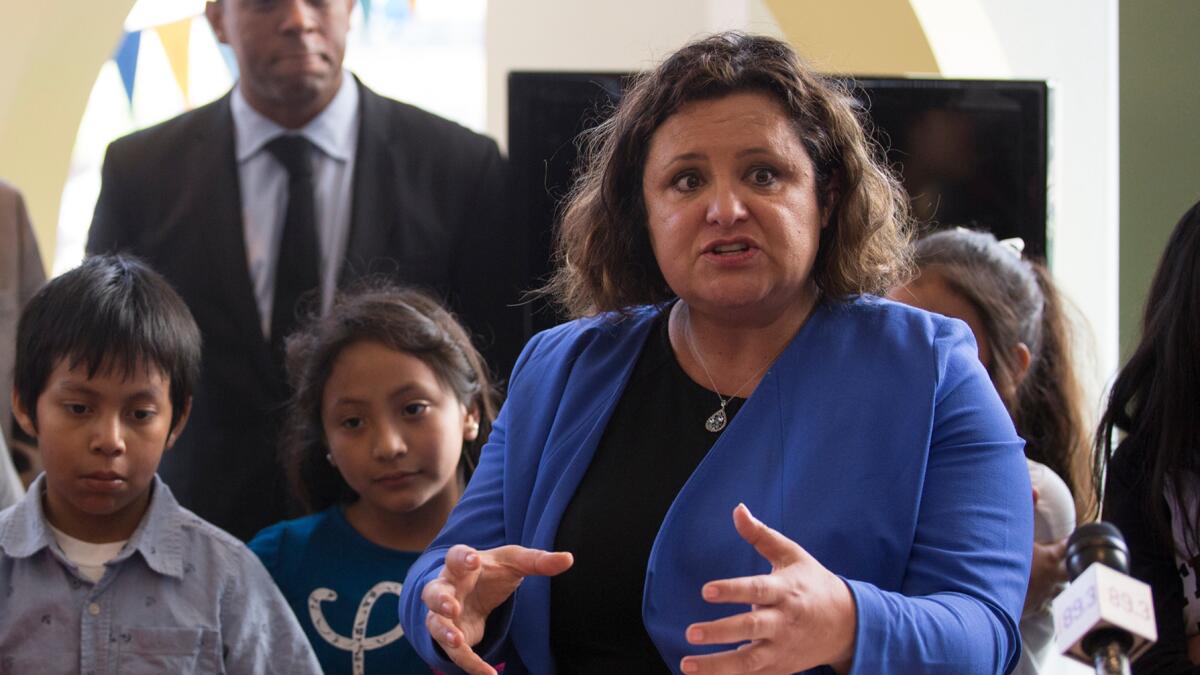Group that wants to launch new L.A. schools names its first grant winners

- Share via
A group that has vowed to start high-quality schools across Los Angeles on Thursday announced its first grant recipients: a charter school that is expanding, an after-school and summer enrichment program for children, and an organization that recruits recent college graduates for two-year teaching stints.
None of the money went to the Los Angeles Unified School District, although it’s likely to benefit from the teacher-recruitment effort.
The grants are the first concrete indication of the direction of Great Public Schools Now, a recently formed nonprofit with a particular formula for school reform: Take a school that works and make it larger or build a new one just like it.
The work is vital, say organizers, because 160,000 students in low-income neighborhoods attend failing public schools.
The reform effort grew out of a preliminary, confidential proposal, circulated last year among philanthropists, to move half of L.A. Unified’s students into charter schools over eight years. The proposal, which called for building 260 new charter schools, was developed under the auspices of the Eli and Edythe Broad Foundation and provoked widespread controversy when The Times obtained a leaked copy and wrote about it.
The plan, however, evolved over time, the group says, and the current strategy is to support any kind of successful school, including those in L.A. Unified.
“This is a fantastic opportunity for all of Los Angeles,” Executive Director Myrna Castrejón said at a news conference at Heart of Los Angeles, the Westlake enrichment program slated to receive $500,000.
Great Public Schools Now said earlier this week that its grant money would go to creating and expanding effective schools and training teachers and principals.
Heart of Los Angeles does not fit in those categories, but it does well-regarded work.
A second recipient is Equitas Academy Charter Schools, which serves the low-income Pico-Union area, just west of downtown.
Equitas already was building its third small campus. The $2-million grant will make the project more affordable by reducing long-term debt, leaving more money for academic programs, said founder and Chief Executive Malka Borrego.
Charters, most of which are non-union, are run independently of L.A. Unified.
The third recipient, Teach For America, also will receive $2 million, which will pay for part of the training and support for 130 college graduates-turned-teachers.
Great Public Schools Now said Thursday that the TFA dollars exclusively will benefit L.A. Unified. But that is not precisely the case, said Lida R. Jennings, executive director of TFA-Los Angeles. The grant money will go into the organization’s general budget.
Still, several dozen recruits are likely to work in L.A. Unified, which has asked TFA to provide as many as 50 teachers for mild to moderately disabled students, Jennings said. That $2 million would be enough to cover most of TFA’s cost for the L.A. Unified contingent.
Major funders of the announced grants are the W.M. Keck Foundation, the Broad Foundation and the Walton Family Foundation. Walton already was providing about $1 million to TFA-LA this year.
TFA, which was founded to address a teacher shortage in urban and rural schools, has been a major provider of faculty to charter schools across the country. In Los Angeles, about 60% of the corps works in charters.
Great Public Schools Now has not yet developed a grant application process. The first recipients were handpicked after discussions with local organizations.
Whether the group ultimately works to improve L.A. Unified or undermine it by taking away students and funding remains open to question, said Charles Kerchner, a research professor at Claremont Graduate University who studies institutional change in public education.
“If you just look at the priorities that are laid out in the new plan and at least where the first money went, it looks a lot like the original Broad plan in more diplomatic language,” Kerchner said.
Twitter: @howardblume
Editor’s note: Education Matters receives funding from a number of foundations, including one or more mentioned in this article. The California Community Foundation and United Way of Greater Los Angeles administer grants from the Baxter Family Foundation, the Broad Foundation, the California Endowment and the Wasserman Foundation. Under terms of the grants, The Times retains complete control over editorial content.
Sign up for The Wild
We’ll help you find the best places to hike, bike and run, as well as the perfect silent spots for meditation and yoga.
You may occasionally receive promotional content from the Los Angeles Times.




